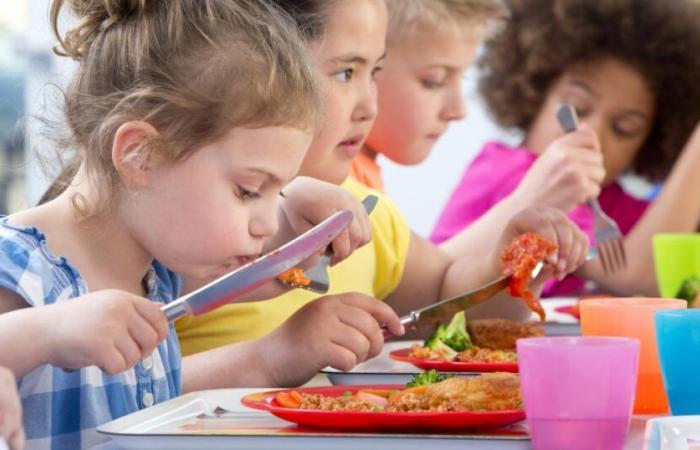At 4 years old, a child can eat exactly the same foods as his parents at the table.
TRUE. At 4 years old, the child has passed the stage of dietary diversification. We can therefore prepare a single meal for the whole family. “Young children will just eat a different amount,” explains Dr. Perle Sayedoff, a nutritionist in Paris and head of a nutrition day hospital. “What I say to parents: offer children at least one less popular food per meal, and have them try it several times, cooked differently. They must be in the discovery and learn that a meal is a portion of starchy foods, one of proteins and one of vegetables. »
A child eats the same amount of food as an adult around the age of 11.
True and false. Everything actually depends on the size of the child, his appetite and especially the physical activity he practices. “That seems a little young to me,” comments Dr. Sayedoff. But it all depends on the intensity of the sport practiced. » An opinion shared by Carine Rolland, dietician-nutritionist in Nantes and nutrition trainer. “If a child of this age does a lot of sport, he can eat as much as an adult woman. If he doesn’t burn everything off, on the contrary he will become overweight. »
Children and adolescents should eat a sweet breakfast.
True and false. It is preferable for children and adolescents to eat breakfast to get through the morning and stay focused… “However, in practice, many children are not hungry in the morning, and you cannot force a child to eat. Be careful, if we offer a mid-morning snack, it must be light so as not to disrupt lunch,” emphasizes Perle Sayedoff. As for the sweet side of breakfast, it is not obligatory. It is better not to eat too many fast sugars to avoid hypoglycemia during the morning. “But we can keep the pleasure side of breakfast without going “all salty”. It’s all about quantities : you can eat a little jam on wholemeal bread for example,” observes Carine Rolland.
Children and adolescents should eat at least five fruits and vegetables a day.
TRUE. “Studies show that the more fiber we eat, the more positive impacts we have on health », explains Doctor Sayedoff. And it’s better to eat a vegetable or fruit repeatedly, like an apple or carrots every day, if the child only likes that, than not at all. “The risk for children who do not eat enough fruits and vegetables is that they suffer from transit problems and deficiencies.” Please note, some preparations do not count as a serving. “I’m thinking of fruit juices or dehydrated vegetable soups for example,” emphasizes Carine Rolland. On the other hand, it’s yes for a compote or a homemade vegetable soup. It can be by default in a bottle or in a brick, paying attention to the quantity of salt. »
We must “force” a child or adolescent to eat a food until he likes it.
Faux. Forcing him risks disgusting him for good. “It is better to show him that other people like this food and eat it – notably his parents, and to invite him regularly to taste it. Including and above all by cooking it differently », reports Perle Sayedoff. It is also necessary to take into account the taste of the child, who may sometimes not like a food at all.
We must “force” a child or teenager to finish their plate.
Faux. “No, definitely not!” Doctor Sayedoff protests. Many health professionals even think that this is one of the causes of obesity, because when we do this, we imply that we are not taking into account the child’s hunger and satiety. So in the future he could tell himself that he can eat when he is not hungry.” Because there is indeed a difference between hunger and the desire to eatwhich is important to teach children. “And be careful of the child or teenager who says they no longer want them at the table,” warns Carine Rolland. It should not be a “strategy” to eat more at snack time, for example.”
-Ultra-processed meals should only be offered to them in case of emergency.
TRUE. Doctor Sayedoff defines them as “products containing components in their recipe that we do not have at home”. She advises consuming it as little as possible. “They are the least interesting nutritionally. Studies show that the more a product is processed, the more at risk it is. In adults, their consumption is correlated with the incidence of cancer, obesity, diabetes, hypertension… »
For their health, it is better to prevent a child or adolescent from being vegetarian.
True and false. The two experts believe that this is a delicate subject, the main problem being finding a sufficient and quality source of protein. “4-17 year olds particularly need it. They are important because their muscles and their bodies are growing,” explains Perle Sayedoff. “You really should avoid being vegan, for example, at this age,” assures Carine Rolland. If you agree to eat dairy products and eggs you can balance a meal, but watch out for iron and vitamin D deficiencies. It may be better to see a dietician or nutritionist in this case. »
The best snack is “bread and chocolate”.
Rather true. “It’s definitely better than a processed industrial cake! It’s an interesting snack, because it contains slow sugars that settle and good fat in the chocolate. On the other hand, there is a little lack of fiber,” says Dr. Sayedoff. The idea would be to add a piece of fruit, for example, to make up for this lack.
It is a good idea to take them to the market/fruit or vegetable producer.
TRUE. “Yes, it’s very good!” enthuses Perle Sayedoff. They will choose for themselves what they want to eat, and even discover new fruits and vegetables. This helps develop curiosity and desire. » Some producers offer the possibility of picking the products directly, which also makes the experience fun for children.
Explaining the risks of junk food is necessary.
TRUE. Paradoxically, it is better to avoid prohibitions in terms of junk food. “The ban actually makes you want to eat it, because it generates frustration,” explains Perle Sayedoff. But it is necessary limit junk food by making this meal occasional and by not necessarily ordering a soda with the “fries + burger” menu. “If possible, we must favor homemade and quality. And explain the risks even if it is complicated to the little ones. Without harping on, the subject must not become obsessive because the child can develop eating disorders,” says Carine Rolland. Finally, it is helpful for parents to set an example by eating correctly. Note that the site mangebouger.fr has just released a guide on nutrition for 4-11 year olds.






